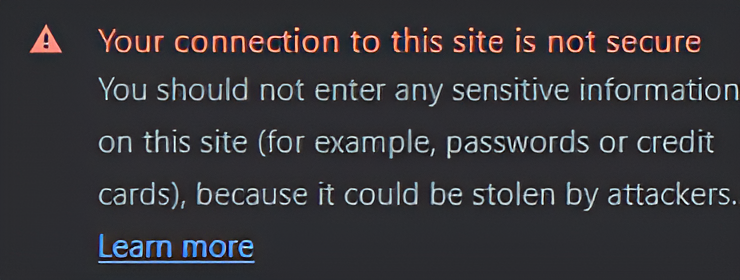Web Development Trends: Embracing SSL and HTTPS as Standard Practice
In the dynamic realm of web development, maintaining a competitive edge necessitates a perpetual state of staying ahead. To remain sure of the visual aesthetics, functioning and security of their websites, developers must possess knowledge of the advanced practices and best standards within their domain. In current years, notable growth is seen in the usage of encrypted technologies like HTTPS and SSL.
The purpose of this article is to examine the basis of an SSL certificates, the significance of SSL, and the impact HTTPS has on the website creation process.
What are SSL, TLS and HTTPS?
The Secure Sockets Layer (SSL) and its upgraded version, Transport Layer Security (TLS), originated back during the initial stages of developing the Internet. These protocols have undergone remarkable progress since their introduction. In addition, these are driven by the objective of maintaining privacy and ensuring the confidentiality of information exchanged between servers and clients. For instance, an individual engages in communication on a website by means of an encrypted connection, thereby ensuring the safeguarding of privacy and security for both parties involved.
In the past, SSL was mostly linked to e-commerce websites and online banking. In these areas ensuring safe transactions was of utmost importance.
With the increasing complexity of cyber threats, the significance of using encryption techniques for safeguarding various online interactions has become more important. This has pushed for the universal adoption of HTTPS (Hypertext Transfer Protocol Secure), where the “S” stands for secure. Major web browsers now mark websites without HTTPS as “Not Secure,” potentially deterring users from accessing them.


Web Development Trends and SSL Adoption
Web development trends are continually changing to accommodate user expectations and technological advancements. In recent years there’s been a significant emphasis on enhancing user experience, which includes prioritising website security. The use of SSL certificates as a regular practice in the web development process aligns seamlessly with this trend. Let us explore how and why embracing SSL and HTTPS has become a standard practice in modern web development:
SEO Boost: Improve Your Search Engine Presence
The online worlds is super-competitive, so a getting a higher search engine ranking can be a game-changer. Search engines, led by Google, have acknowledged the importance of secure websites by considering HTTPS as a ranking factor.
The impact might be subtle, but it’s significant. Websites using HTTPS enjoy a slight SEO advantage over their non-secure counterparts. As search algorithms evolve, this advantage can become even more pronounced. Implementing SSL certificates is a strategic move for enhancing search engine visibility. Ensuring your website is secured with HTTPS will contribute to getting better search engine rankings and increased organic traffic, ultimately leading to a broader online reach and potential business growth.
Data Protection: Safeguarding User Confidentiality
Users have become more careful when providing personal information online because of the several security breaches that have occurred in recent years. This emphasises the critical need to take stringent precautions while transmitting sensitive information online.
If an unauthorised third party were to intercept data being sent between a user’s browser and your website’s server, SSL would make the intercepted information unreadable.
For developers, the prioritisation of data security extends beyond technical considerations. It represents a dedication to upholding user trust and confidentiality while fostering a secure environment that enables users to participate with confidence.
User Trust: Forging Stronger Connections
Trust is the cornerstone of successful online interactions. Users who perceive a website as trustworthy are likelier to engage, share information, and even make transactions.
Step into the realm of SSL and HTTPS, where security assumes a central role. A padlock symbol gracefully appears in the browser’s address bar, offering a reassuring sight. This visual indicator stands as a testament to unwavering commitment to safeguarding online security. This simple yet impactful icon holds significant psychological weight, nurturing a feeling of trust and dependability. Consequently, users find themselves more inclined to spend extended periods on the platform, delving into its offerings, and transitioning from casual visitors to loyal patrons. Through embracing SSL and HTTPS, a foundation of trust is established, forming the bedrock for enduring user relationships.
Compliance Requirements: Navigating the Regulatory Landscape
Adherence to industry standards and legal requirements is non-negotiable in an increasingly regulated digital landscape. Various industries and regions have instituted strict regulations that mandate the encryption of data transmission. From healthcare to finance, e-commerce to government websites, SSL compliance is a best practice; it is a legal prerequisite.
By integrating SSL certificates into your web development projects, you ensure your website complies with these regulations, avoiding potential legal pitfalls and safeguarding your business’s reputation. Compliance is more than a checkbox; it is a proactive step towards demonstrating your commitment to data protection and responsible online practices.
Data breaches cause financial lorr, and according to a recent study the top five industries that experienced data breach costs were:
Mobile-Friendly Focus: Enhancing Cross-Device Experiences
The online experience is becoming increasingly mobile-centric, with users accessing websites and services from diverse devices. Ensuring a seamless and secure browsing experience across these platforms is paramount. SSL certificates contribute significantly to achieving this goal. Whether users browse from a desktop computer, tablet, or smartphone, SSL ensures consistent security and trust. Mobile users, who often engage in on-the-go transactions and interactions, are reassured by HTTPS, increasing user satisfaction and a higher likelihood of conversions. By embracing SSL and HTTPS, you are catering to the present and preparing your website for the mobile-dominated future.
Future-Proofing: Paving the Way for Innovation
Mastering the ever-changing web development landscape is an ongoing battle to stay one-step ahead of the curve. Discover the undeniable power of embracing SSL and HTTPS – not merely a fleeting trend, but a visionary investment in the boundless potential of tomorrow. It represents a dedication to upholding user trust and confidentiality, while also fostering a secure environment that enables users to participate with confidence. Hence, by integrating SSL and HTTPS now, you are laying the foundation for seamless integration with these innovations. This forward-thinking approach enhances your website’s functionality and user experience and positions you as an early adopter of technological advancements.
Affordable SSL Certificates: Why You Should Invest?
While the benefits of SSL and HTTPS are evident, some businesses and developers might be concerned about the cost of implementation. However, the landscape of SSL certificates has evolved, and there are now options to buy cheap SSL certificates from authorized resellers that provide robust security without breaking the bank.
Investing in an affordable SSL certificate offers several advantages:
Cost-Efficiency
A discounted SSL or Cheap SSL certificates are a cost-effective way to enhance your website’s security and user trust without a significant financial burden.
Easy Implementation
SSL certificate providers offer simplified processes for certificate issuance and installation, making it straightforward for developers to integrate SSL into their websites.
Encryption Strength
Even budget-friendly SSL certificates provide strong encryption, ensuring your users’ data remains secure during transmission.
Validation Levels
While premium SSL certificates offer extended validation (EV) and additional trust indicators, budget options still provide domain validation (DV) or organisation validation (OV), improving security and user confidence.
Widespread Compatibility
SSL certificates are recognised by all major web browsers, ensuring a seamless user experience across different platforms.
In Conclusion: Embracing the SSL and HTTPS Revolution
The web development landscape constantly evolves, driven by technological advancements and user expectations. In this ever-changing environment, embracing SSL and HTTPS as standard practices has become necessary rather than an option. The benefits—from improved ROI and user trust to data protection and compliance—are too significant to ignore.
Therefore, it is wise to go with low priced or cheap SSL certificates accessible for businesses and developers of all sizes to implement robust security measures.
By integrating SSL and HTTPS into your web development projects, you align with current industry trends and contribute to a safer and more trustworthy online ecosystem.
As you embark on your web development journey, remember that SSL and HTTPS are more than just technical implementations—they are integral components of a modern and secure online presence. By prioritizing these protocols, you set the stage for a successful and user-friendly web development experience that stands the test of time.
Credit for images: MockoFun




